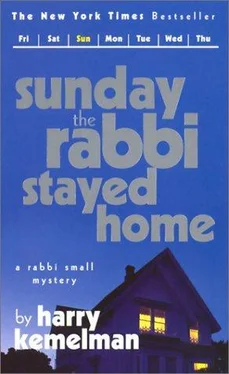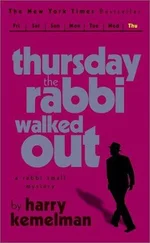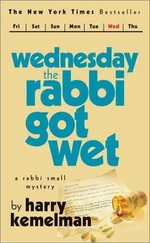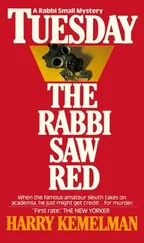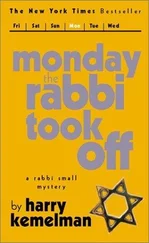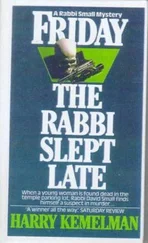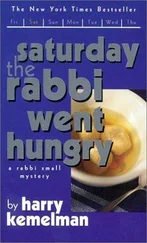Harry Kemelman - Sunday the Rabbi Stayed Home
Здесь есть возможность читать онлайн «Harry Kemelman - Sunday the Rabbi Stayed Home» весь текст электронной книги совершенно бесплатно (целиком полную версию без сокращений). В некоторых случаях можно слушать аудио, скачать через торрент в формате fb2 и присутствует краткое содержание. Город: New York, Год выпуска: 2002, ISBN: 2002, Издательство: iBooks, Жанр: Иронический детектив, на английском языке. Описание произведения, (предисловие) а так же отзывы посетителей доступны на портале библиотеки ЛибКат.
- Название:Sunday the Rabbi Stayed Home
- Автор:
- Издательство:iBooks
- Жанр:
- Год:2002
- Город:New York
- ISBN:978-0743452380
- Рейтинг книги:3 / 5. Голосов: 1
-
Избранное:Добавить в избранное
- Отзывы:
-
Ваша оценка:
- 60
- 1
- 2
- 3
- 4
- 5
Sunday the Rabbi Stayed Home: краткое содержание, описание и аннотация
Предлагаем к чтению аннотацию, описание, краткое содержание или предисловие (зависит от того, что написал сам автор книги «Sunday the Rabbi Stayed Home»). Если вы не нашли необходимую информацию о книге — напишите в комментариях, мы постараемся отыскать её.
Sunday the Rabbi Stayed Home — читать онлайн бесплатно полную книгу (весь текст) целиком
Ниже представлен текст книги, разбитый по страницам. Система сохранения места последней прочитанной страницы, позволяет с удобством читать онлайн бесплатно книгу «Sunday the Rabbi Stayed Home», без необходимости каждый раз заново искать на чём Вы остановились. Поставьте закладку, и сможете в любой момент перейти на страницу, на которой закончили чтение.
Интервал:
Закладка:
Harry Kemelman
SUNDAY THE RABBI STAYED HOME
To my children—
Ruth and George,
Arthur, Diane and Stanley
THE CREATION OF RABBI SMALL
A Special Foreword by Harry Kemelman
I was born and grew up in a Jewish neighborhood in Boston. We moved several times, but always to a Jewish neighborhood, that is, one which had enough Jews to support a Jewish butcher shop and a Jewish grocery where you could buy herring and hard-crusted rye bread rather than the wax-wrapped loaf advertised as “untouched by human hand” (understandably) that was sold in the chain stores. These had to be within walking distance of one’s home. Few people had cars in those days, and even those were stored in a garage for the winter since streets were not plowed, only sanded. Any area that could support these two was also able to support a shul or a synagogue.
I stayed out of school for every Jewish holiday, accompanying my father to the synagogue, mumbling the required passages as fast as I could but never as fast as my father. He would recite the Amidah and sit down before I was halfway through, even though I skipped a lot. During the High Holidays, when the synagogue was jammed, I would say I was going up to the balcony to see my mother, and then skip out and play with the other youngsters, and later when I was a teenager, stand around and flirt with the girls.
Although everyone in the congregation recited the passages in Hebrew, only a few knew the meaning of the words they were saying.
We did not pray, at least not in the sense of asking or beseeching. We davened, which consisted of reciting blessings expressing our gratitude, reading passages from the Bible and the Psalms. What petitionary prayers there were, were for the land of Israel and for the Jewish nation as a whole. It is perhaps simplistic, but nevertheless indicative, that our equivalent of “Give us this day our daily bread” is “Blessed art thou. O Lord, for bringing forth bread from the earth.”
Fifty years ago. I moved to the Yankee town that I have called Barnard’s Crossing in my books, where the few Jews in the area had decided to establish a synagogue. Of necessity, since there were so few of us, it was set up as a Conservative synagogue so that the few older members who were likely to be Orthodox on the one hand and the Reform on the other, would not feel the service too strange. In point of fact, most of them knew little or nothing of their religion. They were second and third generation Americans; their parents had received little from their immigrant parents and passed on even less to their children. Onlv one or two of the older Orthodox members kept kosher homes.
They knew about religion in general from their reading or from the movies they had seen, but little or nothing of the tenets of Judaism. Typical was the reaction of the young lawyer who had asked the rabbi they had engaged to bless the Cadillac he had just bought. He was surprised and hurt when the rabbi refused and said he did not bless things. The friends in the synagogue whom he told of the rabbi’s refusal felt much the same way.
I was fascinated by the disaccord between the thinking of the rabbi and that of the congregation, and the problems it gave rise to. So I wrote a book about it. My editor, Arthur Fields, thought the book too low-keyed and suggested jokingly that I could brighten it up by introducing some of the exciting elements in the detective stories that I had written. As I passed by the large parking lot of our synagogue it occurred to me that it was an excellent place to hide a body. And as a rabbi is one who is learned in the law and whose basic function is to sit as a judge in cases brought before him, it seemed to me that he was the ideal character to act as an amateur detective by searching out the truth. Thus was born Rabbi David Small.
Chapter One
Now, that’s what I call praying. Rabbi.” said Harvey Andelman. “We finished five minutes”—a glance at his watch—“no seven minutes ahead of schedule.”
The rabbi, Rabbi David Small, smiled as he continued to roll up his phylacteries. He was young, in his mid-thirties; although in good health, he was pale and thin and carried his head slightly forward, as though peering near-sightedly at a book. He had indeed gone through the service at breakneck speed and felt a little sheepish about it. “You see. I’m going on a trip—”
“Sure, and you want to make an early start—naturally.” It seemed perfectly reasonable to Andelman, who had a market in Salem and was always trying to speed up the morning prayers so that he could get to his place of business in good time. He was in torment on those days when they had to wait around to secure the ten men needed for the minyan; and as soon as he spotted the tenth man, he would wave him on as he might a runner nearing the tape, calling, “C’mon, c’mon, let’s get going.” But now, luxuriating in his unexpected five, no. seven minutes of grace, he waited for the rabbi to put away his phylacteries and prayer shawl. “When Wasserman leads, or the cantor, you’d think it was Yom Kippur, that they got all day. And come to think of it. I guess they have. But the rest of us, we got jobs and businesses to go to. Well, be seeing you. Rabbi.” he said, loping off to his car.
Because he felt guilty about having hurried the prayers. Rabbi Small slowed down his pace to a stroll as he went along the corridor that led to his study. For the first time in a long while he noted the bare white cinder-block outer wall divided halfway up to no purpose by a strip of black plastic; the similarly divided yellow-glazed brick inner wall; the rubber tile floor, gleaming from a recent waxing, on which only the circled imprint of the floor polisher gave some semblance of design. It had the sterile feel of a hospital corridor.
When he had first come to Barnard’s Crossing six years ago, the temple had been brand-spanking-new, and its modernity had a gay sparkle. But now it was beginning to show signs of age. There were scuff marks along the wall, and at one point near the ceiling there was a yellow stain where a pipe joint had let go. The rabbi could not help feeling that the older temples, with their carved paneling in mahogany or walnut, tended to age more gracefully.
As he neared his study he heard his phone ringing and hurried to answer it. He assumed it was Miriam with a last-minute request to pick up something—a bottle of milk, some rolls—at the grocery, but it was a man’s voice, the tone accusing.
“Rabbi? Ben Gorfinkle. I called your house, and your wife said you were at the temple.”
“The morning services—”
“Of course.” said the temple president, as though conceding it was a legitimate excuse. “You know, Rabbi, the damnedest thing happened this morning. We were chewing the fat over a second cup of coffee, and Sarah mentioned that you were going to Binkerton.”
“I told you several weeks ago that I was going,” the rabbi remarked.
“Oh, I knew you were going to hold Sabbath services for some Hillel group, but I didn’t realize you were going to Mass State at Binkerton. It just goes to show you what a small world it is. My Stuart is there.”
“Oh, really? I didn’t know that.”
“Look, I thought maybe you’d say hello for us and—”
“But of course. Mr. Gorfinkle.”
“I’m sure he’ll come to your service, but just in case he gets tied up, maybe if you took his phone number—”
“Of course. Just a minute—let me get a piece of paper.” He jotted down the number.
“It’s a dormitory, so if he’s not there, you can leave a message.”
“I understand.”
“If you call him when you get in. maybe he could show you around the campus.”
Читать дальшеИнтервал:
Закладка:
Похожие книги на «Sunday the Rabbi Stayed Home»
Представляем Вашему вниманию похожие книги на «Sunday the Rabbi Stayed Home» списком для выбора. Мы отобрали схожую по названию и смыслу литературу в надежде предоставить читателям больше вариантов отыскать новые, интересные, ещё непрочитанные произведения.
Обсуждение, отзывы о книге «Sunday the Rabbi Stayed Home» и просто собственные мнения читателей. Оставьте ваши комментарии, напишите, что Вы думаете о произведении, его смысле или главных героях. Укажите что конкретно понравилось, а что нет, и почему Вы так считаете.
